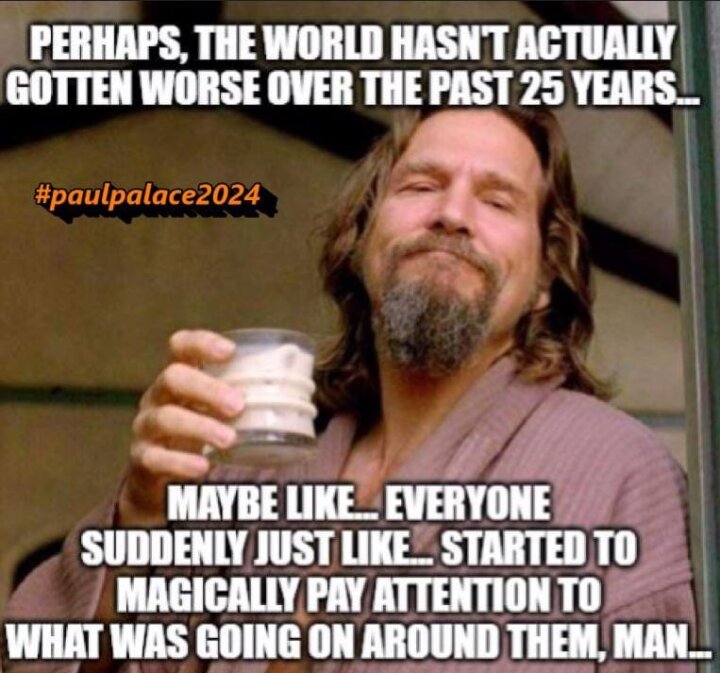@
SDavis You are missing the point AND you are misstating the facts based on a romanticized version of the past... YOUR past. It's less about IF the food tasted the same or different and more how people choose to remember it. If you pull up opinion-based articles from past decades, you will find that each generation has a romanticized memory of how things were better when they were growing up. The food tasted better, the music was better, people were more polite, etc. It's an interesting and consistent pattern of human behaviour through the ages. If you talk to grandparents who grew up during the "Great Depression" or read testimonials of people who lived through World War I, if you read personal histories of people who grew up and lived through the 1800's and so on, that romanticized past is contrasted with conditions of "today" whether that today was in the 1920's, 1930's, 1940's, 1950's and on and on and on.
Yes, food is grown differently today and technology is different today than it was before factories were part of the supply chain and before automation came into play dating all the way back to the 1700's that led the way to Luddites to fight back on changes thrust on society by automation. That's not the point though. The point is that no matter those changes each generation feels as though something has been lost by
[i]their[/i] current day progress based on the current day
they are living in.
As far as water and air being cleaner in the 1960's... that's a big fat lie. Before widespread and universal government regulation of the environment, raw sewage was being spilled into waterways, city incinerators were widely used to burn trash, and water impurities were not controlled or mitigated. If a 1960's kid was forced to live in a 1920's city, the smell of horse feces alone would be traumatic. There is a reason life expectancy across the developed world has continued to rise. Most of the environmental destruction and pollution including climate change originated from the recklessness of the 1960's (and before) and to suggest otherwise only validates the romanticization effect.
The idea that life was basically the same between the 1920's and the 1960's is bizarre and untrue from cultural, spiritual, environmental, economic, political, and fashion and lifestyle perspectives, but I recognize that is your chosen memory that belongs to you. Perhaps you never heard of the Bay of Pigs invasion (1961). Possibly, you missed the history lesson on the violence of the Luddites (1770's). Maybe you were sick on the day of the Mi Lie Massacre in Vietnam (1968) and the Kent State Massacre (1970). Perhaps you never heard about the Clutter murders (1959) memorialized by the Truman Capote blockbuster book, In Cold Blood, that literally everyone (except you, no doubt) was talking about when it was released (1966). You most likely missed the "Crime of the Century" argued by renowned attorney, Clarence Darrow of the senseless and just-for-fun murder by Leopold and Loeb (1924) murder of Bobby Franks and on which the blockbuster book, Compulsion was based (1956). It's possible you skipped over the violence that started the Civil Rights Movement in the USA that covered most of the 1960's with bloodshed and the string of high-profile assassinations (John F. Kennedy, Martin Luther King, Jr., Robert F. Kennedy).
Food may not taste as good to YOU today in contrast to your memory of the food in the 1960's, but maybe your taste buds have changed. They do change over time and with aging. Look, this is not to say you shouldn't have pride in the time you grew up if that's what you want to be proud about. There were many good things that happened in the 1960's, I'm sure. But, history combined with reality suggests it wasn't heaven-on-earth, food was not most likely as good as you remember it, and the world was not
oh, so much better. Finally, more than likely based on an established pattern of human behaviour, 40 years from now, 56-60 year olds in that time will look back on this time, now, with romanticized wonder.
I'm not minimizing your prized memory of a time gone by; I am challenging your rendition of a reality that doesn't match what really happened and that follows a predictable pattern that seems to occur as each decade goes by. I guess we can say, it's what people and their neighbours do.













